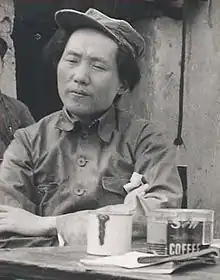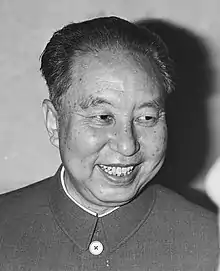Premier of the People's Republic of China
The premier of the State Council of the People's Republic of China, commonly called the premier of China and sometimes also referred to as the prime minister, is the head of government of China and leader of the State Council. The premier is nominally the second most powerful position in China's political system, under the general secretary of the Chinese Communist Party (paramount leader), and holds the highest rank in the civil service of the central government.
| Premier of the State Council of the People's Republic of China | |
|---|---|
| 中华人民共和国国务院总理 | |
.svg.png.webp) National Emblem of the People's Republic of China | |
 | |
| Style |
|
| Type | Head of government |
| Member of |
|
| Reports to |
|
| Residence | Zhongnanhai |
| Seat | Premier's Office, Zhongnanhai, Beijing |
| Nominator | President (chosen within the Chinese Communist Party) |
| Term length | Five years, renewable once |
| Constituting instrument | Constitution of the People's Republic of China |
| Precursor | Chairman of the Council of People's Commissars of the Chinese Soviet Republic |
| Inaugural holder | Zhou Enlai |
| Formation | 7 November 1931 (Chinese Soviet Republic) 1 October 1949 (People's Republic of China) |
| Abolished | 22 September 1937 (Chinese Soviet Republic) |
| Unofficial names | Prime Minister |
| Deputy | Vice Premier State councillor |
| Salary | CN¥152,121[1] |
| Website | www.gov.cn |
| Premier of the State Council of the People's Republic of China | |||||||
|---|---|---|---|---|---|---|---|
| Simplified Chinese | 中华人民共和国国务院总理 | ||||||
| Traditional Chinese | 中華人民共和國國務院總理 | ||||||
| |||||||
| Alternative Chinese name | |||||||
| Simplified Chinese | 国务院总理 | ||||||
| Traditional Chinese | 國務院總理 | ||||||
| |||||||
Politics of China |
|---|
.svg.png.webp) |
|
The premier is responsible to the National People's Congress and its Standing Committee. The premier serves for a five-year term, renewable once. The premier presides over the plenary and executive meetings of the State Council, and is assisted by vice premiers in their work. Every premier has been a member of the Politburo Standing Committee since the PRC's founding in 1949, except during brief transition periods. In China's political system, the premier is generally thought to be responsible for managing the economy.[2]
The incumbent premier is Li Keqiang, who took office on 15 March 2013. He succeeded Wen Jiabao.
History
In 1989, then Premier Li Peng, in cooperation with the then Central Military Commission chairman Deng Xiaoping, was able to use the office of the Premier to order the military crackdown of the Tiananmen Square protests of 1989.
The premier has been supported by four vice-premiers since Deng Xiaoping's reform in 1983. The first-ranked vice premier will act in the premier's capacity in their absence.
Powers and duties
Officially, the premier is approved by the National People's Congress upon the nomination of the president. In practice, the candidate is chosen within the Chinese Communist Party (CCP) through deliberations by incumbent CCP Politburo members and retired CCP Politburo members as part of the process of determining membership in the incoming new CCP Politburo Standing Committee. Under this informal process, the eventual future premier is initially chosen as first vice-premier before assuming the position of premier during a subsequent round of leadership transitions.[3] Both the premier and the vice-premier are selected once every five years. The premier and the vice-premiers are limited to two terms. The premier has always been a member of the Politburo Standing Committee of the Chinese Communist Party.
The premier is the highest administrative position in the Government of China. The premier is responsible for organizing and administering the Chinese civil bureaucracy. For example, the premier is tasked with planning and implementing national economic, social development and the state budget.[4] This includes overseeing the various ministries, departments, commissions and statutory agencies and announcing their candidacies to the National People's Congress for vice-premiers, state councillors and ministerial offices. The premier's role and responsibilities are codified into the constitution unlike a prime minister's from the Westminster system as by convention or traditions.[4]
The premier does not have command authority over the armed forces, but is the head of the National Defense Mobilization Commission of China and deputy head of the CCP National Security Commission which are departments of the armed forces. Since the 1980s, there has been a division of responsibilities between the premier and the general secretary of the Communist Party wherein the premier is responsible for the technical details of implementing government policy while the general secretary gathers the political support necessary for government policy.
List of premiers
Chinese Soviet Republic (1931–1937)
The head of government is Chairman of the Council of People's Commissars.
 1st — Mao Zedong
1st — Mao Zedong
(served: 1931–1934) 2nd — Chang Wen-t'ien
2nd — Chang Wen-t'ien
(served: 1934–1937)
People's Republic of China (1949–present)
 1st — Zhou Enlai
1st — Zhou Enlai
(served: 1949–1976) 2nd — Hua Guofeng
2nd — Hua Guofeng
(served: 1976–1980).jpg.webp) 3rd — Zhao Ziyang
3rd — Zhao Ziyang
(served: 1980–1987) 4th — Li Peng
4th — Li Peng
(served: 1987–1998)_(cropped).jpg.webp) 5th — Zhu Rongji
5th — Zhu Rongji
(served: 1998–2003).jpg.webp) 6th — Wen Jiabao
6th — Wen Jiabao
(served: 2003–2013).jpg.webp) 7th — Li Keqiang
7th — Li Keqiang
(served: 2013–present)

Living former premiers
As of October 2022, there are two living former premiers: the most recent death was Li Peng who died at the age of 90 years.
| Premier | Term of office | Date of birth |
|---|---|---|
| Zhu Rongji | 1998–2003 | 23 October 1928 |
| Wen Jiabao | 2003–2013 | 15 September 1942 |
See also
- List of premiers of China
- List of premiers of the People's Republic of China
- List of leaders of the People's Republic of China
- Vice premier of the People's Republic of China
- President of the People's Republic of China
- Prime minister of China (disambiguation)
- List of Chinese leaders
- Paramount leader
- Political position ranking of PRC
References
- "Public employees get salary increase - China - Chinadaily.com.cn". www.chinadaily.com.cn. Archived from the original on 2019-06-05. Retrieved 2019-11-06.
- Wei, Lingling (2022-05-11). "China's Forgotten Premier Steps Out of Xi's Shadow as Economic Fixer". Wall Street Journal. ISSN 0099-9660. Retrieved 2022-10-16.
- "China's backroom power brokers block reform candidates". Southern China Mourning Post. South China Morning Post Publishers Ltd. Retrieved 26 September 2021.
- http://english.people.com.cn/constitution/constitution.html Archived 2009-07-06 at the Wayback Machine, Section 3, Article 88 and Article 89.
External links
- Official PRC Government Website
- Corpus of Political Speeches Free access to the Prime Minister’s work report and political speeches from other regions, developed by the Hong Kong Baptist University Library.
_(cropped).jpg.webp)
_01.jpg.webp)